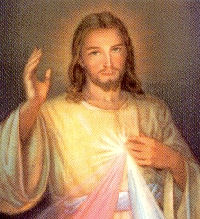Easter: April 16th
Second Sunday of Easter (or Sunday of Divine Mercy)
Other Titles: Low Sunday; Domenica in albis; Quasimodo Sunday
» Enjoy our Liturgical Seasons series of e-books!
"I shall sing forever the Lord's mercy" (Ps 89 [88]).
Today is the Sunday of Divine Mercy, the Octave Day of Easter.
From Creation, God has revealed his nature as love itself, in Sacred Scripture and most perfectly in the life, Passion, death and Resurrection of his Son, Jesus. In his second encyclical, Dives In Misericordia (Rich in Mercy), Pope Saint John Paul II offers an extended meditation on the mystery of God’s mercy, which he calls “the greatest of the attributes and perfections of God” (Dives in misericordia, 13). He returned to this theme throughout his pontificate:
As a gift to humanity, which sometimes seems bewildered and overwhelmed by the power of evil, selfishness, and fear, the Risen Lord offers His love that pardons, reconciles, and reopens hearts to love. It is a love that converts hearts and gives peace. How much the world needs to understand and accept Divine Mercy!
Lord, who reveals the Father’s love by Your death and Resurrection, we believe in You and confidently repeat to You today: Jesus, I trust in You, have mercy upon us and upon the whole world. —Pope John Paul II, Regina caeli message for Divine Mercy Sunday, April 3, 2005
The Divine Mercy Sunday origin is from a revelation to Saint Faustina, a Sister of Mercy in Poland who initiated the Divine Mercy devotion. Between 1930 and 1938 Jesus requested numerous times a Feast of Divine Mercy. On May 5, 2000, five days after the canonization of Saint Faustina, the Vatican decreed that the Second Sunday of Easter would henceforth be known as Divine Mercy Sunday.
Divine Mercy Sunday Readings, Cycle A
The First Reading is taken from Acts 2:42-47. On Pentecost Sunday the Holy Spirit, as promised by Christ, descended on the Apostles with external signs which brought the people of Jerusalem in their hundreds to the Upper Room where the Apostles with external signs which brought the people of Jerusalem in their hundreds to the Upper Room where the Apostles lived. St. Peter addressed them and explained what had happened, with the result that “about three thousand souls were baptized and added that day” (Acts 2:41) to the Apostles and disciples, who formed the nucleus of the Christian Church.
In these six short verses of the second chapter of the Acts we are given a picture of the fervent religious life of the first Christian community. As would be expected, these Jerusalem Christians, having the Apostles still among them, and the memory of the resurrection and the descent of the Holy Spirit still fresh in their memories, were animated and moved by a deep religious fervor.
The Second Reading is from the First Letter of St. Peter 1:3-9. This first epistle of St. Peter has always been accepted as authentic, that is, it was written by St. Peter and most probably from Rome which he called “Babylon.” 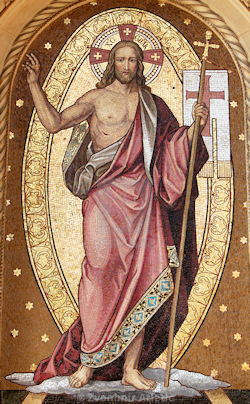 Tradition says he died a martyr there in 64 or 67. The letter, therefore, was written before 67 at the latest. It is in the form of an encyclical letter to the numerous churches of Asia Minor. Its purpose was to recall to the minds of these converts to the Church the basic doctrines of Christianity and to encourage them to endure any persecution that the faithful observance of their new religion might bring on them from their pagan or Jewish neighbors.
Tradition says he died a martyr there in 64 or 67. The letter, therefore, was written before 67 at the latest. It is in the form of an encyclical letter to the numerous churches of Asia Minor. Its purpose was to recall to the minds of these converts to the Church the basic doctrines of Christianity and to encourage them to endure any persecution that the faithful observance of their new religion might bring on them from their pagan or Jewish neighbors.
We have just celebrated the feast of the resurrection, and St. Peter’s words today are intended to remind us again of what that unique event means to us and to the Christian faith which we profess. It is the final and convincing proof of the Incarnation. The Christ who had been born as a baby of the Virgin Mary, had lived in Nazareth, had preached the message of salvation, had died on the cross, was none other than what he had said he was, the divine Son of God. He had come to give mankind life and “abundant” life—an eternal life hereafter in the kingdom of his Father.
The first converts to Christianity had grasped this truth, this consoling knowledge, and they rejoiced in it “with unutterable and exalted joy.” We, too, have grasped this truth; we, too, know that through the Incarnation, death and resurrection of Christ, we have been made heirs to an “inheritance which is imperishable, undefiled and unfading.” But do we always let this consoling knowledge, this Christian conviction, govern and regulate our daily lives and actions?
The things of this world are very close to us and hard to ignore. Heaven seems very far away, and may seem to be something we can worry about later. The joys and pleasures of this passing life are very attractive because they surround us so closely now—the thought of the true, unending pleasure and happiness, much as it satisfies and answers to our innate human, intellectual desires and ambitions, can easily be pushed into the background by the hustling and bustling of the present, temporary attractions.
Let us remember that “our faith is more precious than gold”: let us never forget these words of St. Peter.
The Gospel is read for all years (Cycles A, B and C) and is taken from John 20:19-31. Last Sunday’s gospel, also taken from St. John, described the first hint at the resurrection which the Apostles received. Peter and John, convinced that the body had not been taken away, because the winding sheets were left behind, were beginning to believe. But the others were skeptical, the two disciples on the way to Emmaus paid no heed to the women’s story, and Thomas refused to believe the testimony of the other ten, even when this present appearance of our Lord had convinced them.
It may surprise and amaze us that the Apostles were so reluctant to believe that Christ had risen from the dead, to live forever in glory with his Father in heaven. But we must remember that during their two or three years with him they saw nothing in him but a mere man, one with divine powers, but yet a man; certain prophets of the old covenant had some such powers also. Christ had “emptied himself” of his divine nature, and he had foretold his resurrection many times. But that he could be really God, as well as man, was something they could not then grasp, and if he was a mere man death had to be the end.
Their slowness of faith had its value for the future Church and for all of us. If they had been expecting the resurrection, and anxiously looking forward to it, people could say that they imagined it, that they persuaded themselves it had happened. Indeed, there have been men proud of their acuteness of judgment, who have said that the story of the resurrection is a story of mass hallucination, although all the evidence proves the opposite. Their conviction that it could not happen, could not be removed from their minds except by impressive evidence that it had. Hallucination is born in a mind already excepting and hoping for the imagined fact.
We can thank the Apostles and especially Thomas, the last to give in, that our faith in the resurrection and divine glorification of Christ is that much the stronger. Our Christianity which would have ended before the first Easter week had passed, if Christ had not risen in glory, spread rapidly to the then known world and is still spreading because its author was none other than Christ “our Lord and our God.” How prophetic were the words of the Gamaliel at the meeting of the Sanhedrin which tried to prevent the Apostles from preaching the new Christian faith: “if this plan or work is of men, it will overthrown; but if it is of God, you will not be able to overthrow it” (Acts 5:38-39).
—Excerpted from The Sunday Readings , Cycle A, by Fr. Kevin O'Sullivan, O.F.M.
Second Sunday of Easter or Divine Mercy Sunday
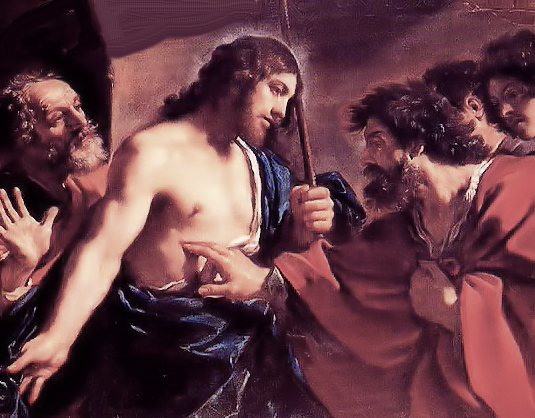 The Holy Gospel that the Liturgy presents to us on this second Sunday of Easter, is one of the most well known, discussed, and appreciated—the meeting of the Risen Lord with St Thomas. The Fathers of the Church have given us numerous insights into this Gospel text. Likewise, it is has proven the inspiration to the numerous artists who have physically represented the events of this Gospel in order to give us a clear idea of what happened, ‘eight days after’ the first apparition of the Risen One, to the disciples congregated in the cenacle.
The Holy Gospel that the Liturgy presents to us on this second Sunday of Easter, is one of the most well known, discussed, and appreciated—the meeting of the Risen Lord with St Thomas. The Fathers of the Church have given us numerous insights into this Gospel text. Likewise, it is has proven the inspiration to the numerous artists who have physically represented the events of this Gospel in order to give us a clear idea of what happened, ‘eight days after’ the first apparition of the Risen One, to the disciples congregated in the cenacle.
Jesus’ response to Thomas, after he recognized Him as ‘My Lord and my God’, has a mysterious fascination that must relate not so much to the disciples—those who ‘have seen’—but rather to those, like us, who were added to their number afterwards. ‘You have come to believe because you have seen me. Blessed are those who have not seen and have believed.’ (Jn 20:29)
The attention that these words evoke seems yet more paradoxical if we remember that the Lord had proposed, to the same author of the Gospel, what can be justly referred to as the Christian method, ‘come and see’ (Jn 1:39). How can we possibly reconcile these two phrases by Jesus that form the ideal setting for the whole of the fourth Gospel? Perhaps, in the end, the Lord decided to change His method? What do the words ‘have not seen’ really mean?
The timely recollection of the ‘eight days after,’ which is the Sunday after the Resurrection, permits us to tie our reflection to one of the most significant Eucharistic hymns composed by another Thomas, St Thomas Aquinas. In the Adore Te Devote, which refers to the Eucharist, we read: ‘Sight, touch, taste are all deceived in their judgement of you. But hearing suffices firmly to believe’. Combining these words with today’s Gospel we can justly affirm that the experience ‘to see’ was not denied to us, but it is in contrast with the Apostle Thomas’ physical experience, who was able to put his own finger into the holes in Christ’s hands and side, whilst we can only comprehend it in the faith which is guarded and transmitted by the Church, our Mother and Teacher.
That which we ‘have not seen’ is therefore the glorious Body of the Risen One. However, today we have the ability to ‘listen’ to the Word of God and the Magisterium of the Church and so we can ‘see’ the real Body of Christ which is the Eucharist. We can ‘see’ His Mystical Body which is the Church. We can ‘see’ Him in our lives and in the lives of our many brothers who, after meeting the Lord in a real but mysterious way, are united to Him in His Spirit!
Like Thomas, Christ calls us to fill the holes left by the instruments of the passion in His Body with our own hands so that our lives and the verbal witness that we give proclaim His Resurrection. Our senses could betray us, but we know that we have met the Risen One and we have recognized Him!
The certain hope that Peter, who betrayed the Lord three times for fear of death, proclaims to us with the words, ‘rejoice with an indescribable and glorious joy’ (1 Peter 1:8), become fully comprehensible because blessed are they that ‘have not seen’ the Risen Lord, but seeing the joy of His disciples ‘have believed’ in Him!
—From the Congregation for the Clergy
Jesus to Sr. Faustina
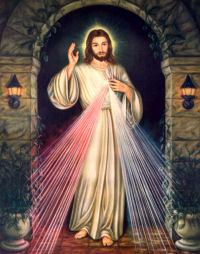 On one occasion, I heard these words: "My daughter, tell the whole world about My inconceivable mercy. I desire that the Feast of Mercy be a refuge and shelter for all souls, and especially for poor sinners. On that day the very depths of My tender mercy are open. I pour out a whole ocean of graces upon those souls who approach the fount of My mercy. The soul that will go to Confession and receive Holy Communion shall obtain complete forgiveness of sins and punishment. On that day all the divine floodgates through which graces flow are opened. Let no soul fear to draw near to Me, even though its sins be as scarlet. My mercy is so great that no mind, be it of man or of angel, will be able to fathom it throughout all eternity. Everything that exists has come forth from the very depths of My most tender mercy. Every soul in its relation to Me will contemplate My love and mercy throughout eternity. The Feast of Mercy emerged from My very depths of tenderness. It is My desire that it be solemnly celebrated on the first Sunday after Easter. Mankind will not have peace until it turns to the Fount of My Mercy.
On one occasion, I heard these words: "My daughter, tell the whole world about My inconceivable mercy. I desire that the Feast of Mercy be a refuge and shelter for all souls, and especially for poor sinners. On that day the very depths of My tender mercy are open. I pour out a whole ocean of graces upon those souls who approach the fount of My mercy. The soul that will go to Confession and receive Holy Communion shall obtain complete forgiveness of sins and punishment. On that day all the divine floodgates through which graces flow are opened. Let no soul fear to draw near to Me, even though its sins be as scarlet. My mercy is so great that no mind, be it of man or of angel, will be able to fathom it throughout all eternity. Everything that exists has come forth from the very depths of My most tender mercy. Every soul in its relation to Me will contemplate My love and mercy throughout eternity. The Feast of Mercy emerged from My very depths of tenderness. It is My desire that it be solemnly celebrated on the first Sunday after Easter. Mankind will not have peace until it turns to the Fount of My Mercy.
"[Let] the greatest sinners place their trust in My mercy. They have the right before others to trust in the abyss of My mercy. My daughter, write about My mercy towards tormented souls. Souls that make an appeal to My mercy delight Me. To such souls I grant even more graces than they ask. I cannot punish even the greatest sinner if he makes an appeal to My compassion, but on the contrary, I justify him in My unfathomable and inscrutable mercy. Write: before I come as a just Judge, I first open wide the door of My mercy. He who refuses to pass through the door of My mercy must pass through the door of My justice.
"From all My wounds, like from streams, mercy flows for souls, but the wound in My Heart is the fountain of unfathomable mercy. From this fountain spring all graces for souls. The flames of compassion burn Me. I desire greatly to pour them out upon souls. Speak to the whole world about My mercy."
—Excerpted from Diary of Sr. M. Faustina Kowalska
Highlights and Things to Do:
- Read the Apostolic Peniteniary Decree on the Indulgences attached to devotions in honour of Divine Mercy.
- Read Dives in Misericordia (Rich in Mercy), the encyclical Letter of John Paul II on Mercy.
- On Good Friday, 1937, Jesus requested that St. Faustina make a special Divine Mercy Novena before the Feast of Mercy, from Good Friday through the following Saturday. Jesus also asked that a picture be painted according to the vision of Himself as the fountain of mercy. He gave her a Chaplet of Divine Mercy to be recited and said that it was appropriate to pray the chaplet at three o'clock each afternoon (the Hour of Great Mercy).
- See Catholic Cuisine for some inspirational food ideas for this Feast of Divine Mercy.
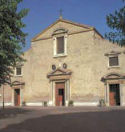
Second Sunday of Easter (or Sunday of Divine Mercy)
Station with San Pancrazio (St. Pancras):
The last stational procession is held at the Church of St. Pancras. Those newly baptized are now full fledged members of the Christian community. This church is most appropriate since St. Pancras was a young man of fourteen who sealed his baptismal promises with his blood.
For more on San Pancrazio, see:
For further information on the Station Churches, see The Stational Church.


